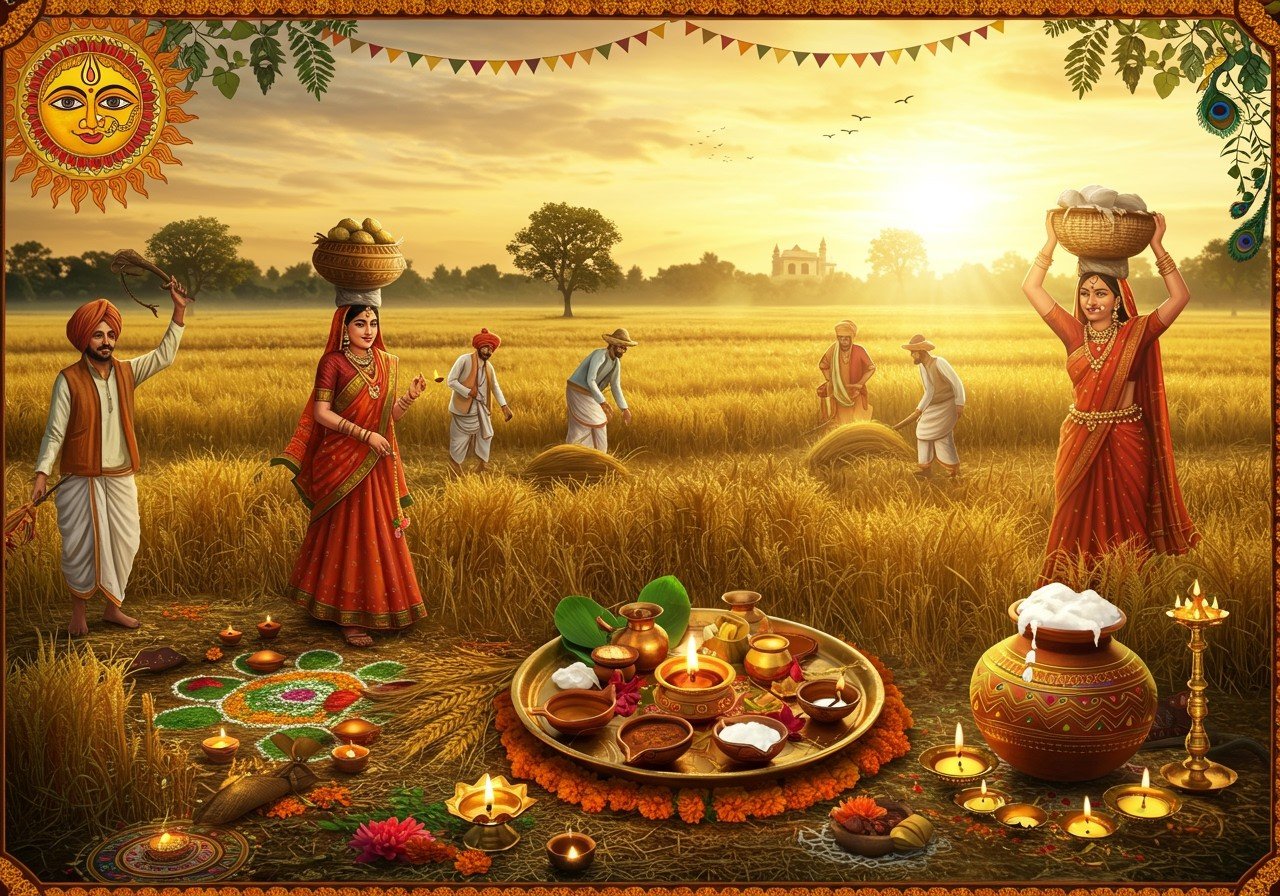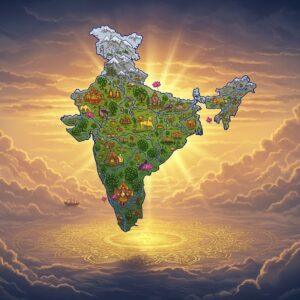
India, a predominantly agrarian nation, vibrantly celebrates numerous harvest festivals. These joyous occasions express gratitude for nature’s abundance and mark significant astronomical changes and seasonal transitions. These festivals coincide with the main harvests in different regions, varying throughout the year due to India’s diverse climate and the wide array of crops cultivated.
Let’s delve into some prominent harvest festivals across India:
Pongal: Tamil Nadu’s Harvest Celebration
In Tamil Nadu, Pongal stands as a prominent four-day harvest festival of gratitude and renewal, observed in January. Each day carries unique significance, steeped in tradition and symbolism.
- Bhogi Pongal: This day centers on discarding old belongings and embracing new beginnings. People light bonfires and burn discarded items, symbolizing a fresh start for the new year. The ritual signifies purification and readiness to receive blessings.
- Surya Pongal: Dedicated to the Sun God, Surya, this day features the ceremonial cooking of freshly harvested rice with milk in new clay pots. This Pongal dish is offered to the deity as thanksgiving for a bountiful harvest. The ritual highlights the sun’s crucial role in agriculture.
- Mattu Pongal: This day honors cattle, recognizing their vital role in agriculture. Farmers adorn their cattle with colorful decorations, garlands, and bells, expressing gratitude for their contribution to the harvest. They also offer prayers for the animals’ well-being.
- Kaanum Pongal: This day focuses on family reunions and strengthening social bonds. People visit friends and relatives, sharing meals and exchanging gifts. It’s a time of joyous gatherings and community celebration.
Pongal deeply connects with Tamil Nadu’s agricultural heritage, strengthening family bonds and expressing gratitude for prosperity. Poojn.in offers pure ghee and other essential items to enhance your Pongal celebrations.
Lohri: A Punjabi Winter Farewell
Lohri, primarily celebrated in Punjab on January 13th, marks the end of the winter solstice. Bonfires illuminate the night as families gather around, singing traditional folk songs and sharing stories. The festival symbolizes warmth, community spirit, and the anticipation of longer days.
- Bonfires and Offerings: People toss sesame seeds, gur (jaggery), and rewri (sesame brittle) into the fire as offerings. These symbolic foods carry cultural significance – til (sesame) signifies unity, gur represents purity, and rewri embodies prosperity. The act of offering them to the fire signifies gratitude and a prayer for blessings.
- Celebrating New Beginnings: Lohri also marks new beginnings, particularly births and marriages in Punjabi families. It’s a time to rejoice in new life and wish for happiness and prosperity in the coming year. The festival’s festive atmosphere creates a sense of shared joy and hope.
Lohri strengthens community bonds through shared rituals, dance, music, and festive treats. You can find fresh paddy seeds and other traditional items for your Lohri celebrations at poojn.in.
Makar Sankranti: A Pan-Indian Festival
Makar Sankranti is a pan-Indian festival celebrating the sun’s entry into Capricorn (Makara). This celestial transition signifies the end of winter and the start of longer days, ushering in an auspicious period known as Uttarayan.
- Regional Variations: While the core significance remains consistent, each region has its distinct customs. In Gujarat and Rajasthan, kite flying is a prominent tradition, filling the skies with vibrant colors. In Karnataka, it’s known as Sugi Habba, where farmers express reverence for the Sun God. These regional variations enrich the festival’s overall tapestry.
- Symbolic Foods: Til (sesame) and gur (jaggery) are common ingredients in festive treats during Makar Sankranti. These symbolize warmth and sweetness, reflecting the changing season. The consumption of these foods is considered auspicious and is believed to bring good health and prosperity.
Makar Sankranti unites diverse customs under a shared celebration of nature’s rhythms. Poojn.in offers a wide array of sesame seeds and other puja essentials to enhance your Makar Sankranti observance.
Baisakhi: Punjab’s Dual Celebration
Baisakhi holds dual significance in Punjab, marking both the harvest season and the establishment of the Khalsa Panth by Guru Gobind Singh in 1699. It is a time of vibrant festivities, religious observance, and community gatherings.
- Harvest Celebrations: Baisakhi signifies the culmination of the harvest season, a time of abundance and prosperity. Farmers express gratitude for the bountiful yield and pray for continued blessings in the coming year. The occasion is marked by joyous celebrations, reflecting the community’s agricultural heritage.
- Khalsa Panth Foundation: For Sikhs, Baisakhi holds deep religious significance as the anniversary of the Khalsa Panth’s founding. Gurdwaras hold special prayers and processions, commemorating this historical event. The day reaffirms Sikh identity and values.
Baisakhi reinforces community bonds, particularly among Sikhs, celebrating both cultural identity and shared history. Celebrate Baisakhi with traditional items from poojn.in, including pancha sasya (five grains) and other essential ingredients for your festive preparations.
Other Notable Harvest Festivals
Several other harvest festivals enrich India’s cultural tapestry:
- Bhogali Bihu (Assam): This joyous festival involves traditional dances, games, and feasting. People offer thanks for a successful harvest and indulge in treats made with coconut, jaggery, and rice.
- Onam (Kerala): This ten-day festival marks the mythical homecoming of King Mahabali. It features elaborate floral decorations (pookalam), boat races (Vallam Kali), and grand feasts (Onasadya).
- Nabanna (West Bengal): Nabanna celebrates the new rice harvest. The first grains are offered to Goddess Lakshmi, seeking blessings for continued prosperity. It is a time of communal feasting and cultural performances.
- Nuakhai (Odisha): Nuakhai marks the arrival of the new rice crop. Families gather for a communal meal, savoring the first rice of the season. It is a time of gratitude and celebration of agricultural abundance.
- Ugadi (Andhra Pradesh, Telangana, and Karnataka): Marking the new year, Ugadi involves oil baths, wearing traditional attire, and preparing special dishes like Ugadi Pachadi, a symbolic mix of six tastes representing life’s experiences.
- Gudi Padwa (Maharashtra): Gudi Padwa signifies the beginning of the new year in Maharashtra. People erect gudi flags, symbolizing victory and new beginnings. It is a time of festive gatherings and traditional sweets.
- Wangala (Meghalaya): Celebrated by the Garo tribe, Wangala is a post-harvest festival of thanksgiving to the Sun God, Misi Saljong. It involves elaborate rituals, traditional dances, and community feasts.
Embrace the Spirit of Harvest with Poojn.in
Poojn.in, India’s leading online store for cultural goods and services, offers a wide selection of puja items, traditional clothing, and festive décor to enrich your harvest festival celebrations. Experience the convenience of online shopping with our extensive collection and reliable delivery services. Let poojn.in help you honor these vibrant traditions and create meaningful experiences.


